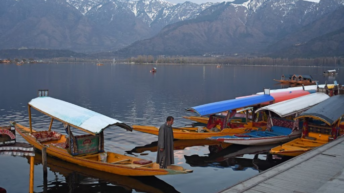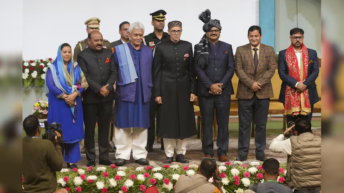|
Listen to article
Getting your Trinity Audio player ready...
|

In the early hours of 1st February, 2021, Myanmar’s dalliance with electoral democracy came to an abrupt end, as the Tatmadaw (Armed Forces of Myanmar) assumed command of the country for one year. It detained State Counsellor Aung San Suu Kyi, the de facto leader of National League for Democracy (NLD) government as well as President Win Myint, on charges of electoral fraud. NLD had just swept the elections held in November 2020 and the new parliament was to be convened on 01 February itself. Along with NLD leaders and Chief Ministers, many other journalists, activists, and artists, who were critical of the military; were incarcerated. The coup d’état of 2021, the third in Myanmar’s political history — the first two being in 1962 and 1988 – could derail Myanmar’s recent trajectory of economic growth. This coup has not only altered Myanmar’s political landscape, but also has the potential to destabilize the geopolitics of the South and Southeast Asian region. Historically, Myanmar holds a deeply isolationist streak in its foreign policy. But since the late 1980s, it has become increasingly dependent on China in the face of intense international criticism of the Tatmadaw’s authoritarianism. This began to change in the first decade of the century, as the country progressed towards democracy, selectively removing restrictions, and slowly opening up, thereby raising hopes of democrats the world over which have now unfortunately collapsed.
The existing government structure was not entirely democratic, as the 2008 constitution guarantees 25 per cent seats to the military in the Parliament and does not permit constitutional amendments without a 75 per cent majority. In addition, Tatmadaw controlled three crucial ministries including Home, Defence and Border affairs. Consequently, the elected representatives were not free to decide domestic or foreign policy on their own and the military remained as the final arbiter. This resulted in the NLD Government kowtowing to the military on the Rohingya issues which ultimately led the NLD losing its credibility and international support despite its popularity among the Bamar-Buddhist majority. Following the recent coup, it will be difficult if not totally a lost cause for Aung San Suu Kyi and the NLD to regain their moral high ground internationally. The coup will undoubtedly slow down the pace of foreign investment in Myanmar, which had brought perceptible changes as far as life in Myanmar was concerned. In case the crisis lasts beyond the initial one-year contrary to the promises of the Tatmadaw, there is a danger that Myanmar could go back into the isolationist mode of the Ne Win era, with only China and probably India willing to engage with it.
Prospects of arrangement:
With the military occupying power and declaring a state of emergency, it may be forced to deploy itself in Myanmar’s urban centers, which are likely to be the springboards for protests against the military’s authoritarianism. This could lead to the resurgence of domestic insurgencies in Myanmar, as Tatmadaw will need to thin its presence in the peripheries. Many insurgent groups that had signed the ceasefire agreement with the government, have already voiced their opposition to the military takeover. In any case, over the last two years, clashes between the military and the Buddhist-dominated Arakan Army (AA), an insurgent group based in the country’s west, have left thousands of combatants and civilians dead, and hundreds of thousands displaced in Rakhine and Chin states. To further aggravate matters, Rohingyas, who have been displaced from their homes are rapidly getting radicalised by Islamic State and Al Qaeda.
The government’s decision last March to designate the AA as a terrorist organization has made prospects for peace in the area quite remote. A decision by Myanmar’s Election Commission to cancel voting across much of the Rakhine State had further compounded the problem. Interestingly, just after the vote, both the AA and the Tatmadaw, issued coordinated statements calling for elections in areas where voting had been cancelled. More significantly, the guns have since fallen silent in a fragile but significant cease-fire. This informal truce has now held for more than two months, allowing tens of thousands of displaced civilians to return home. Meanwhile, the warring parties have met three times for discussions on potential elections and further steps to end the conflict. This military interregnum, ironically, could provide a silver lining as far as resolution of the conflict in Rakhine State is concerned. In case the international community provides it with suitable incentives, the Tatmadaw, should not have any compunction in rehabilitating displaced Rohingyas on its soil, as it does not have to worry about its electoral fortunes.
Implications for India:
India’s Act East Policy (AEP) which focuses mainly on strengthening ties with South East Asia and our Eastern neighbours among which Myanmar serves as the gateway to the region, might at best face a temporary setback from the current takeover. The Indian military has excellent relations with the Tatmadaw and the government, despite its proclivities for the establishment of a democratic dispensation, will continue to engage with the military regime; however, the international community is likely to shun Myanmar, which may affect many multilateral projects planned in Myanmar or through Myanmar. Much of AEP relies on Myanmar providing further connectivity to the South East Asian neighborhood. In case instability increases on account of ethnic insurgencies, many of these initiatives may be inordinately delayed or may not remain financially viable. On the positive side, the Tatmadaw’s capability in expeditiously resolving pending issues is likely to be far better than the civilian regime’s own.
The Government of India in its official statement has noted the developments in Myanmar with deep concern and stated that “India has always been steadfast in its support to the process of democratic transition in Myanmar. We believe that the rule of law and the democratic process must be upheld.” As a democracy, the statement is on the expected lines, but it would be premature to visualise any drastic alterations in India’s engagement with Myanmar. It is essential to continue the interaction, so as not to leave the field open for China. It is significant to note that the Tatmadaw was not very happy with the recent signs of bonhomie between China and the NLD government.
While India should try to nudge the regime on the path of democracy, this time frame should be utilised to expedite the projects of physical connectivity. The Trilateral Highway or India-Myanmar-Thailand (IMT) Project could be accelerated and the Tatmadaw could be requested to revert back to left-side driving in the country as that could facilitate seamless movement from Kathmandu to Singapore through India, Bangladesh, Thailand and Malaysia, besides Myanmar, as all of them drive on the left. The long pending Kaladan Multi Modal Transit Transport Project (KMTTP) also needs to be expedited, as KMTTP is a Government-to-Government Project being promoted by the Tatmadaw. The recent visit of India’s Foreign Secretary and the Chief of Army Staff to Myanmar in October 2020, highlighted the significance of Myanmar to India and the utilisation of the military to spearhead diplomatic engagements with countries ruled by military hierarchies. It is hoped that the Indian government will use this channel to engage with the current regime in Myanmar, while maintaining its existing lines of communications with the NLD leadership.






Add comment